Panel Discusses Engineering for Global Development During Congress Keynote
Panel Discusses Engineering for Global Development During Congress Keynote
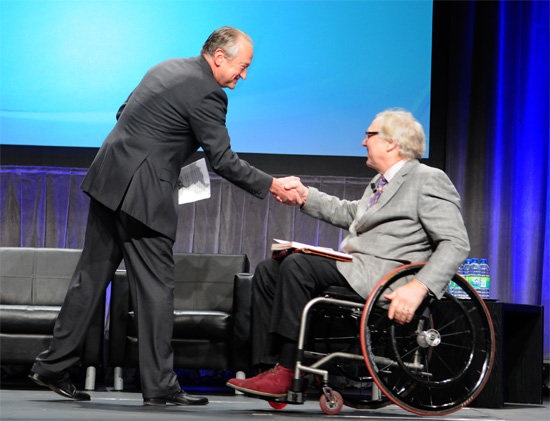
The engineering of affordable, appropriate and sustainable solutions for the developing world — engineering for global development — was the theme of the 2014 Congress as well as the focus of the conference's cornerstone activity, the Congress Keynote Event. The Keynote, which took place on the morning of Nov. 17, kicked off a full day of Congress programming dedicated to the topic.
The session, the third installment in ASME’s Decision Point Dialogues panel discussion series, featured four prominent figures from the field of engineering for global development: Paul Polak, founder and CEO of the for-profit social venture Windhorse International; Shyam Rajan, chief technology officer for General Electric Health Care – India; Juliana Rotich, executive director of the non-profit software enterprise Ushahidi Inc., and Bryan Willson, a professor at Colorado State University, and co-founder of clean cookstove company Envirofit. John Hockenberry, the Peabody and Emmy Award-winning journalist and anchor of The Takeaway on National Public Radio, served as Keynote’s moderator.
The spirited, 90-minute discussion covered a host of issues related to the engineering efforts to assist the world’s poorest populations, including the role of for-profit companies in global development field and the difficulties designers can face introducing their products into other cultures.
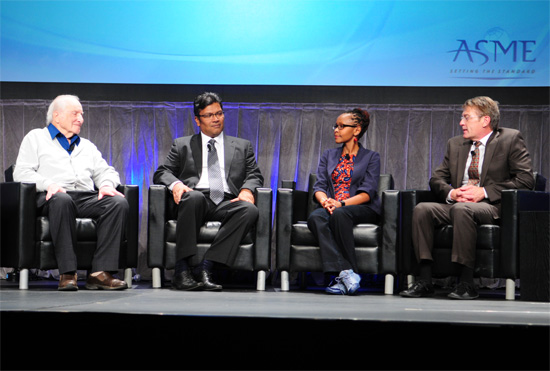
On the subject of whether non-profit or for-profit organizations had a more beneficial effect on the world’s poorest communities, Hockenberry recalled Nobel Prize-winning social entrepreneur, banker, economist Muhammad Yunus’ quote that “poverty should be eradicated and not seen as a money-making opportunity,” and asked the panelists their opinion of the statement.
Perhaps unsurprisingly, Polak, whose companies seek to turn a profit producing and selling products in developing markets, held an opposing view. “I think there is a niche for businesses that don’t make money but have a social mission, but the biggest unmet challenge in development from my perspective is scale,” he said. “To reach scale, you have to make a reasonable profit so that you can attract investment capital.” He added that the real market for this market — the billion people around the world who live on less than $2.50 a day — “is not for consumer goods. It’s for income-generating opportunities.”
Rotich, whose non-profit tech company develops free and open-source software in Africa, said that while she saw Polak’s point the need for a business model, she did agree with Yunus, particularly in the case of rural and off-grid communities like those she visited in Kenya that simply didn’t have the infrastructure to support grassroots businesses without support from non-profit organizations. Those communities required organizations’ “income infusion, but also education,” she said. “They need capital, education, talent, and a link to other places” that would create a “flow between some of these edge communities and the greater global innovation story.”
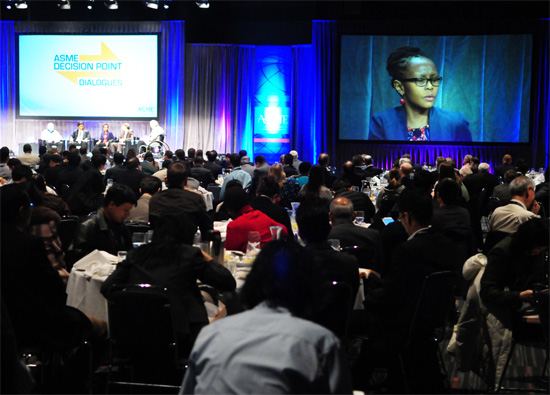
As the conversation turned to the subject of how engineers can often misjudge customers or users when developing products for other cultures, Willson related an experience his company, Envirofit, had introducing a cookstove that featured a new alloy in the stove’s metal combustion chamber.
After years of accelerated testing, he said, the cookstoves were sent to India “and immediately had failures that were unexplainable. The combustion chambers just corroded very rapidly. It was corrosion from milk. We worked with Oak Ridge National Labs on development of the alloy, but one thing we didn’t factor into this is that there is a puja – a blessing ceremony – that you do with new cookstoves that involves boiling over milk,” which interferes with the alloy’s oxidation process. Ultimately, the company had to change the metallurgy of the combustion chamber, he said.
At the end of the Keynote, ASME President J. Robert Sims presented Hockenberry with the ASME President's Award for his efforts in promoting engineering to the general public. The award, which was created, provides ASME presidents with the opportunity to offer special recognition to prominent individuals, companies, government agencies, or universities that have made significant contributions to the engineering profession and to technological advancement. In addition to moderating the Congress Keynote, Hockenberry served as moderator of a Decision Point Dialogues seminar on the subject of STEM that was held earlier this year in Washington, D.C., and had hosted a special four-part series on his show The Takeaway called "Meeting the Standard," featuring selected ASME volunteers and staff discussing standards, global development and the engineering profession.
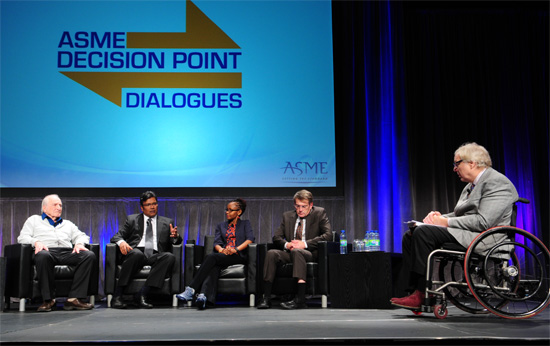
“I can’t tell you how thrilled and honored I am,” Hockenberry said. “It’s wonderful to work with organizations like yours that have a mission that is so important — but often the message from this culture doesn’t get into the mainstream media. And in the world of blacks and whites, and ones and zeroes, it is so important to feel and understand the personality behind the work that you do.”
The Keynote was followed by the three-part Engineering for Global Development Forum, which continued the exploration of topics related to engineering for the developing world. During the first session, “Case Studies in Global Development,” Keynote panelists Polak, Rajan, Rotich and Willson were joined by Lyle Ruppert, principal systems engineer at Ball Aerospace and Technologies Corp., to discuss the entrepreneurial aspects of engineering for global development.
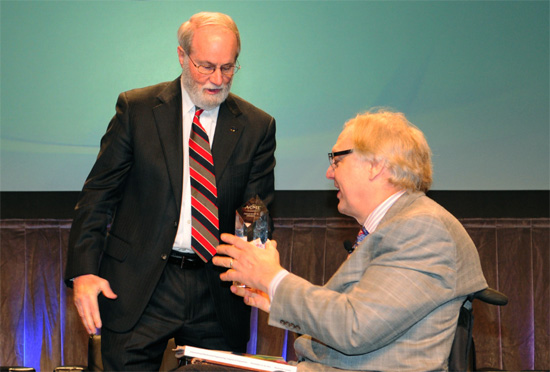
A second Forum session, “The Rise of Research in Engineering for Global Development,” which concentrated on current academic research being conducted and the need for more researchers and students to get involved, featured Nate Johnson from Arizona State University, Benjamin Linder from Olin College, Annica Wayman from the U.S. Agency for International Development’s U.S. Global Development Lab; and former ASME Innovation Showcase winner Amos Winter from MIT.
Johnson and Winter were the moderators for the third Global Development Forum Session, “Aligning Global Development with an Academic Career,” with Gang Chen, the head of MIT’s mechanical engineering department, Gary Dirks, director of Arizona State University’s Global Institute of Sustainability, and Bill Wepfer, the Eugene C. Gwaltney Jr. School Chair and professor of mechanical engineering at Georgia Institute of Technology.




